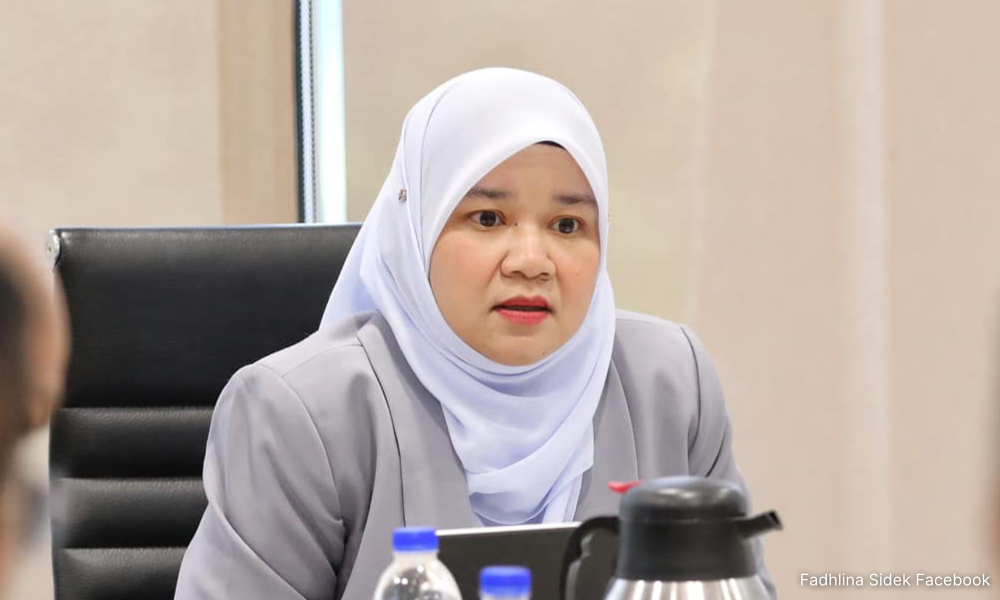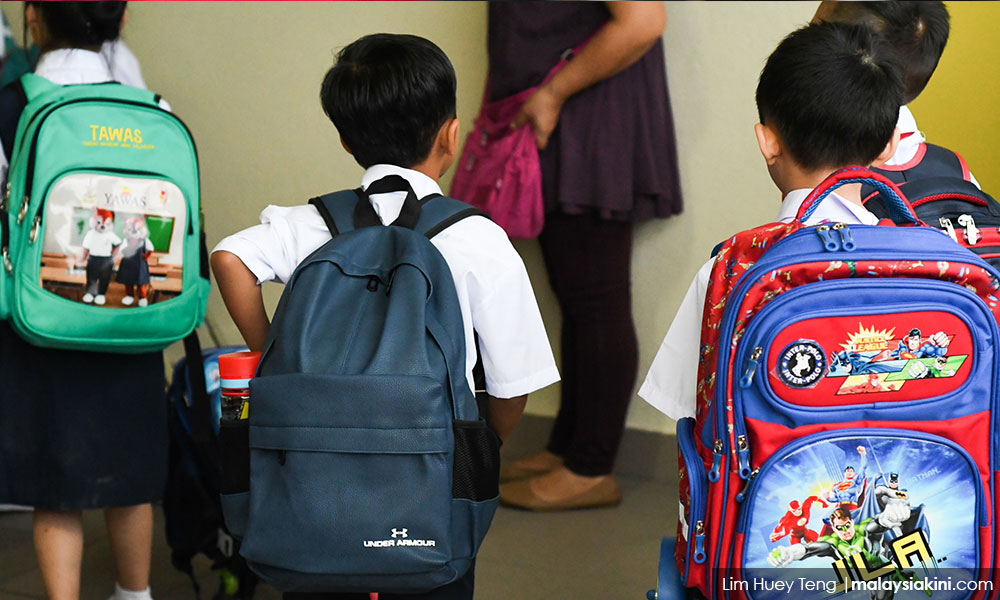
Fa Abdul
Published: Apr 2, 2024
COMMENT | “Tangachi, come get some ambra fruit juice! Only RM4 a packet!” shouted a man at a Ramadan bazaar the other day.
I smiled and walked to his stall.
“Tangachi, I also have lemon juice, watermelon juice, sugar cane juice…” he continued promoting his products.
“Please don’t call me tangachi. Just call me adik or kakak, okay?” I said politely.
The man was taken aback but quickly apologised.
“I am so sorry! I will address you as adik,” he replied.
I appreciated his sincere apology and went ahead to get a packet of my favourite ambra juice.
Some might think there is nothing wrong with the man calling me tangachi. After all, tangachi means younger sister in Tamil. What can be wrong in addressing an Indian woman that way, right?
It’s no different than addressing an Indian waiter at a nasi kandar restaurant as anneh, which means elder brother in Tamil. Surely, we have all heard people saying “Anneh, teh tarik satu!” plenty of times before.
Mind you, no Indian waiters have ever walked to their customers’ tables demanding them to stop calling them anneh.
But then again, while the waiters may have no qualms about being called anneh, it is entirely up to me to like or dislike being called tangachi, no?
Even if I am perfectly fine being called a tangachi by another Indian person, it is my choice and my choice alone not to be called the same by any non-Indian person.
I also don’t owe anyone any explanation why I prefer it that way.
My friends disagree though. They think I should let people call me anything they want, as long as it is not offensive or degrading. They think I am just being fussy.
But who decides if a name is offensive or not? I am sure my friends too would be quick to take offence if they were called aunty by someone older than them, never mind that the term itself is a sign of respect in the Malaysian context.
Honestly, I don’t think I am wrong in expressing my dislike of being called tangachi. When people inform you that they do not like to be called a certain way, the best thing to do is to respect it, and stop calling them that.
Respecting a person’s request is not a hard thing to do, especially when all you have to do is choose a different word to address them.
Respecting others
I have so much respect for Education Minister Fadhlina Sidek who restricts her children from using the term kafir to refer to non-Muslims.
Published: Apr 2, 2024
COMMENT | “Tangachi, come get some ambra fruit juice! Only RM4 a packet!” shouted a man at a Ramadan bazaar the other day.
I smiled and walked to his stall.
“Tangachi, I also have lemon juice, watermelon juice, sugar cane juice…” he continued promoting his products.
“Please don’t call me tangachi. Just call me adik or kakak, okay?” I said politely.
The man was taken aback but quickly apologised.
“I am so sorry! I will address you as adik,” he replied.
I appreciated his sincere apology and went ahead to get a packet of my favourite ambra juice.
Some might think there is nothing wrong with the man calling me tangachi. After all, tangachi means younger sister in Tamil. What can be wrong in addressing an Indian woman that way, right?
It’s no different than addressing an Indian waiter at a nasi kandar restaurant as anneh, which means elder brother in Tamil. Surely, we have all heard people saying “Anneh, teh tarik satu!” plenty of times before.
Mind you, no Indian waiters have ever walked to their customers’ tables demanding them to stop calling them anneh.
But then again, while the waiters may have no qualms about being called anneh, it is entirely up to me to like or dislike being called tangachi, no?
Even if I am perfectly fine being called a tangachi by another Indian person, it is my choice and my choice alone not to be called the same by any non-Indian person.
I also don’t owe anyone any explanation why I prefer it that way.
My friends disagree though. They think I should let people call me anything they want, as long as it is not offensive or degrading. They think I am just being fussy.
But who decides if a name is offensive or not? I am sure my friends too would be quick to take offence if they were called aunty by someone older than them, never mind that the term itself is a sign of respect in the Malaysian context.
Honestly, I don’t think I am wrong in expressing my dislike of being called tangachi. When people inform you that they do not like to be called a certain way, the best thing to do is to respect it, and stop calling them that.
Respecting a person’s request is not a hard thing to do, especially when all you have to do is choose a different word to address them.
Respecting others
I have so much respect for Education Minister Fadhlina Sidek who restricts her children from using the term kafir to refer to non-Muslims.

Education Minister Fadhlina Sidek
Of course, her sincere intention to teach her children to respect others in Malaysia’s multi-religious society was taken out of context and she ended up being slandered as denying a term used in the holy Quran.
Yes, kafir is a term used in the Quran to refer to the non-believers. Choosing not to use the word in a Malaysian social setting only demonstrates respect to fellow Malaysians and no disrespect towards other Muslims.
We live in a country with over 30 million people and we must learn to care, respect and value one another. To get along, we need to be better listeners, we must set rules and boundaries to show respect and courtesy, and we must take note whenever we have opportunities to redeem our mistakes.
When a person or a group expresses their dislike over a certain name or term, before we start defending our rights to continue using those names and terms, we should take a moment to consider their feelings.
Ask ourselves, how difficult is it not to use the term around them? If it is not difficult, then why not do it?
After all, showing respect is so easy. In fact, it is easier than building a brick wall to defend our right to use a certain term.
Being called names
All my 50 years of life, I have been addressed in many ways. I was fond of some of them and not so fond of the others.
I was “Baby” to my dad in my childhood, and “Babi” to my elder brother during my early teens.
I was Fatima to my teachers and close friends, while I was mamak, budak India and keling to some teachers and schoolmates.
I was sayang to my fiancé but that changed to “Oi” after a few years of our marriage.
Afterwards, I became Fa to many, and janda to some.
While I agree that I am still a mamak, budak India, keling and janda, it still offends me to be addressed as such.
As a human being with a proper name and title, I think there are so many different ways to address a person - so why do we address a person in a way that we know would surely offend them?
Unless our ultimate motive is to offend them, it makes no sense to do so.
But then again, common sense doesn’t always make sense in Malaysia.
I remember sending my children to a mosque to attend kelas mengaji (religious classes) when they were much younger. As my children had Indian features and looked different from the others, the other students started calling them budak India.
Of course, there was nothing wrong in addressing two Indian kids as Indian kids, however, since it was making my children uncomfortable, I decided to meet the ustaz who was in charge of the class.
I hoped that he would help get the other kids to address my children by their names to make them feel welcome. Unfortunately, the ustaz disagreed with me.
“They are just being children. Let them be,” he replied.
Clearly, the ustaz did not see anything wrong with having his non-Malay Muslim students being addressed as budak India.
Offensive terms
Like Fadhlina, when my children were growing up, I made sure they addressed their friends, classmates and teachers properly. Every time they used race to describe them, I would reprimand my children.
Of course, her sincere intention to teach her children to respect others in Malaysia’s multi-religious society was taken out of context and she ended up being slandered as denying a term used in the holy Quran.
Yes, kafir is a term used in the Quran to refer to the non-believers. Choosing not to use the word in a Malaysian social setting only demonstrates respect to fellow Malaysians and no disrespect towards other Muslims.
We live in a country with over 30 million people and we must learn to care, respect and value one another. To get along, we need to be better listeners, we must set rules and boundaries to show respect and courtesy, and we must take note whenever we have opportunities to redeem our mistakes.
When a person or a group expresses their dislike over a certain name or term, before we start defending our rights to continue using those names and terms, we should take a moment to consider their feelings.
Ask ourselves, how difficult is it not to use the term around them? If it is not difficult, then why not do it?
After all, showing respect is so easy. In fact, it is easier than building a brick wall to defend our right to use a certain term.
Being called names
All my 50 years of life, I have been addressed in many ways. I was fond of some of them and not so fond of the others.
I was “Baby” to my dad in my childhood, and “Babi” to my elder brother during my early teens.
I was Fatima to my teachers and close friends, while I was mamak, budak India and keling to some teachers and schoolmates.
I was sayang to my fiancé but that changed to “Oi” after a few years of our marriage.
Afterwards, I became Fa to many, and janda to some.
While I agree that I am still a mamak, budak India, keling and janda, it still offends me to be addressed as such.
As a human being with a proper name and title, I think there are so many different ways to address a person - so why do we address a person in a way that we know would surely offend them?
Unless our ultimate motive is to offend them, it makes no sense to do so.
But then again, common sense doesn’t always make sense in Malaysia.
I remember sending my children to a mosque to attend kelas mengaji (religious classes) when they were much younger. As my children had Indian features and looked different from the others, the other students started calling them budak India.
Of course, there was nothing wrong in addressing two Indian kids as Indian kids, however, since it was making my children uncomfortable, I decided to meet the ustaz who was in charge of the class.
I hoped that he would help get the other kids to address my children by their names to make them feel welcome. Unfortunately, the ustaz disagreed with me.
“They are just being children. Let them be,” he replied.
Clearly, the ustaz did not see anything wrong with having his non-Malay Muslim students being addressed as budak India.
Offensive terms
Like Fadhlina, when my children were growing up, I made sure they addressed their friends, classmates and teachers properly. Every time they used race to describe them, I would reprimand my children.

“Your teacher told me there is a new student in your class. Who is it?”
“It’s a Chinese boy.”
“Surely there is a different way to describe this student. Try again.”
“His name is Marcus. He is tall and has funny-looking hair.”
“That’s better.”
Again, there is nothing wrong with calling a Chinese boy a Chinese boy - but describing a person based on their racial identity doesn’t tell us anything unique about the person.
I believe everyone should be celebrated for their uniqueness. As a mother, it was important that my children address others in a way they would like to be addressed themselves.
I must say, raising and educating school-going children on the concept of individual uniqueness, is very challenging indeed.
It is not easy to get your children to stop focusing on racial identity when schools are obsessed with focusing on the very same thing.
“Murid Cina dan India tolong pergi ke kelas Moral.”
“Jangan rapat sangat dengan pelajar bangsa kafir.”
“Budak-budak keling, sila bangun!”
Students and parents of our sekolah kebangsaan will tell you that the above statements are quite common.
There is a way to address non-Malay students without calling them Chinese and Indian kids.
“Murid yang ada Pendidikan Moral, sila tinggalkan kelas” is one way to do it.
Sadly, many people including teachers see no wrong in addressing others according to their race and religion.
Even knowing how sensitive we Malaysians are with the term kafir and keling, many just go about justifying its usage.
Why is it so difficult to stop calling people names they consider offensive? I honestly don’t know.
But I must say, I really appreciated the ambra juice seller who quickly apologised when I told him I did not like to be called tangachi. He did not resort to any explanation to defend himself. All he did was to offer me his sincere apology.
It was not his fault that I felt offended by his choice of words, yet, by apologising and replacing the word with another, he showed me so much respect. As respect only earns more respect, I have now become a regular customer at his stall.
Respect. That is how we build long-lasting relationships. Sadly in our country, not many are capable of understanding this simple concept.
FA ABDUL is a multi-award-winning playwright and director in the local performing arts scene, a published author, television scriptwriter, media trainer, and mother. Her ultimate mission in life is to live out of a small suitcase.
***
kt comments:
Dear Sweetie Fatimah
Have you heard of 'Ultra Kiasu'? Ironically it was coined/uttered by the most 'Ultra Kiasu' bloke in town, wakakaka

You may call her Tamaguchi
ReplyDelete